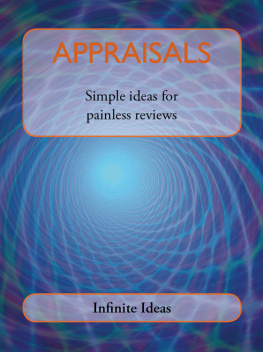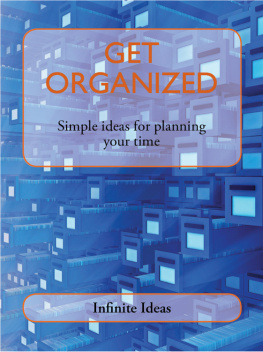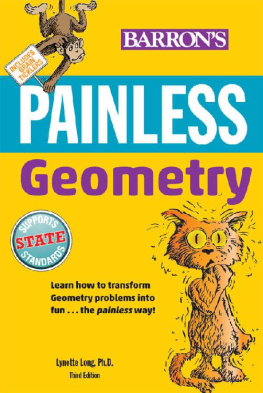Appraisals
Simple ideas for painless reviews
Infinite Ideas with Graham Taylor

Copyright information
Copyright Infinite Ideas 1998, 2012
The right of Graham Taylor to be identified as the author of this book has been asserted in accordance with the Copyright, Designs and Patents Act 1988.
First published in 1998 by David Grant Publishing; revised and updated edition published 2012 by
Infinite Ideas Limited
36 St Giles
Oxford
OX1 3LD
United Kingdom
www.infideas.com
All rights reserved. Except for the quotation of small passages for the purposes of criticism or review, no part of this publication may be reproduced, stored in a retrieval system or transmitted in any form or by any means, electronic, mechanical, photocopying, recording, scanning or otherwise, except under the terms of the Copyright, Designs and Patents Act 1988 or under the terms of a licence issued by the Copyright Licensing Agency Ltd, 90 Tottenham Court Road, London W1T 4LP, UK, without the permission in writing of the publisher. Requests to the publisher should be addressed to the Permissions Department, Infinite Ideas Limited, 36 St Giles, Oxford, OX1 3LD, UK, or faxed to +44 (0) 1865 514777.
A CIP catalogue record for this book is available from the British Library
ISBN 9781908474278
Brand and product names are trademarks or registered trademarks of their respective owners.
Welcome
About Appraisals
Can you learn how to appraise successfully just by reading this short book? The answer is a resounding Yes!
The only bit of waffle in this book
This book is for people with neither the time nor the patience to trawl through acres of jargon. If you want to avoid management-speak and page-filling nonsense, this book is definitely for you. Appraisals has been written in the belief that you can learn all you really need to know quickly and without fuss. The aim is to provide essential, practical advice that you can use straight away.
Is this book for you?
Most companies, whatever their size, use some system of formal appraisals. Very often, these are treated like annual events that have to be endured, like a full medical examination.
This book is for you if:
- You cant really see the point of formal appraisals and
- nor can those around you, especially your staff;
- You want to communicate better with your staff but dont know where to start;
- You struggle to deal with issues of discipline;
- You are never sure that you are giving enough praise;
- You spend most of your management time fighting fires.
By investing a little of your time in reading Appraisals , you can learn quickly how to make appraisals an integral part of your management style. You will find out how to:
- Create an appraisal process that works every time;
- Make appraisals on-going and constructive;
- Plan and prepare properly;
- Interview perfectly;
- Follow up productively;
- Use appraisals to get the best from people and become more effective yourself.
This book takes a very different approach to the question of appraisals from most others. It does not simply rehash current theory but, rather, sets a bold and exciting challenge to you the reader to rethink your attitude to appraisals as a whole. If you want a book that tells you how to fill the forms out sufficiently well to take the heat off until next year, dont bother reading this one. However, if you want to learn to appraise on a daily basis and thereby become a superb manager of people, read on!
How to use this book
The message in this book is Its OK to skim. You dont have to read it all at once, or follow every tip to the letter. Appraisals has been written to dip into, so feel free to flick through to find the help you most need. You also do not have to do everything advised straight away. This book is a collection of hands-on tips designed to help you build the foundations of an appraisals process which will allow you to boost morale, build up peoples skills and effectiveness, and, at the same time, become a much better manager.
You will find that there are some graphic features used throughout the book:
You?
This means Something for you to think about it sets the scene and identifies the problems by prompting you to think about situations which should instantly feel familiar.
Act!
With the problems diagnosed, these features give you the framework for an action plan this will help you to get your own ideas in order.
Tips
This feature appears at the end of each chapter. It is a check-list which condenses all of the advice given throughout the chapter. Similar features appear within chapters which are overflowing with ideas!
As you read through the chapters, you will come across lots of tips and practical advice on how to appraise people well. You can start by going straight to any of the graphic features, which will ask you to either think about a problem or to do something about it and give you some ideas as to how best to tackle it. If youre really pushed for time, you can always go direct to the tips features at the end of each chapter.
The chapter summaries are also a useful reminder when you come to look at this book in the future.
Good luck!
1. Why bother with appraisals?
Whats in this chapter for you
- The all too common reality
- Back to basics
- Keep it regular
- The managers role
- Where appraisals go wrong
- What appraisals should be
The all too common reality
I dread it the annual round of filling out pointless forms, asking the staff stupid questions and then getting them to fill out their own self-assessment forms. Frankly, its like a cross between a school report and a job interview. Once its all done, they get filed only to be taken out and looked at the same time next year. Ive got better things to be doing with my time.
Richard Cross, team leader
You?
Does Richards negative attitude strike a chord with you? Does the formal act of appraising your staff or of being appraised yourself seem to be a total waste of time to everyone in your organization except the personnel director?
The simple fact is that in most organizations the act of appraisal has become institutionalized and, as an instrument of the institution, has been applied unthinkingly and without understanding.
We have a formal appraisal twice a year. The boss seems duty bound to find fault so he picks you up on little things. If he has a problem with my work, why cant he tell me as Im doing it? I always come out of the appraisal feeling completely demoralized surely, thats not the point.
Kerry Bridges, customer service clerk
Appraisals can and should be one of the most effective and important management tools. Used correctly, appraisals will help you to get the most out of individuals and the teams that they constitute. However, if used incorrectly, you can end up with a demotivated work force which will prove impossible to manage properly.
You?
Is the appraisal system you use a help or hindrance to your ability as a manager? Is it something that you just have to put up with, hangovers and Christmas shopping? What about your staff? Are they enriched by the appraisal system, or bored rigid by it?
Back to basics
The great thing about appraisals is that there is nothing mystical, magical or indeed difficult about the process. Most of it is pure common sense, but you have to understand the reason for them in the first place and a little of the theory behind them.
Lets start with a definition.
Next page













